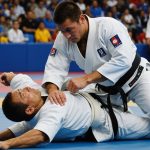Understanding Stress and Anxiety in Athletes
In the realm of sports, anxiety in sports and stress management for athletes are pivotal aspects influencing performance. When athletes experience high stress levels, their physical and mental capacity is taxed, potentially reducing focus, coordination, and endurance. This can result in poor performance outcomes, highlighting the need for effective stress management strategies to maintain optimal performance levels.
Causes of Stress and Anxiety
For many UK athletes, stress emerges from various sources. Pressure to perform, maintain rankings, and meet expectations can be overwhelming. The intense competition, alongside the balancing act of training, personal life, and publicity, adds layers of anxiety. Furthermore, injuries or fear of failure contribute significantly to mental health challenges, underscoring the critical nature of addressing these issues.
Also to discover : Maximize your triathlon success: essential training tips for uk athletes to balance swimming, cycling, and running for optimal race day results
Mental Health Awareness
The spotlight on mental health in UK athletes is growing as evidence mounts supporting its vital role in athletic success. Understanding the importance of mental well-being is essential. This awareness ensures that athletes access necessary resources and support structures, fostering environments where mental health is prioritized equally to physical health, thus achieving a balanced and sustainable sports career.
Mindfulness Techniques
In the competitive world of sports, achieving peak performance often relies on more than just physical prowess. Mindfulness for athletes has emerged as a powerful tool, enhancing concentration and resilience. By incorporating meditation for performance, athletes can sharpen their focus, a vital skill during high-pressure situations.
This might interest you : Essential stretching strategies for uk athletes to prevent injuries and boost performance
There are several mindfulness exercises tailored specifically for sporting excellence. Athletes might practice mental clarity exercises, such as visualization, where they mentally rehearse their sporting performance. This method allows them to anticipate potential challenges and strategize effectively. Another popular technique is focused breathing, which helps regulate anxiety and maintain calm during competitions.
To provide tangible evidence, many UK athletes have experienced success through mindfulness. They’ve reported improved decision-making under pressure, quicker recovery from training, and an enhanced ability to manage stress. For example, some athletes credit mindfulness with providing a mental edge, allowing them to stay grounded and fully present during events.
For athletes seeking to elevate their game, integrating mindfulness can offer numerous benefits. Embracing these techniques not only improves performance but also contributes to overall well-being, demonstrating why mindfulness is an essential component for today’s sports professionals.
Visualization Strategies
Visualization techniques are powerful tools within sports psychology, aiding athletes in performance enhancement. These methods involve creating mental imagery to simulate executing moves or experiencing successful outcomes. This technique prepares the mind for actual performance, fostering confidence and reducing anxiety.
Implementing Effective Visualization Practices
To begin with, find a calm environment where you can focus without distractions. Close your eyes and breathe deeply, promoting relaxation. Begin by visualizing a particular scenario relevant to your sport, imagining yourself performing optimally. Try to incorporate all senses—see the field, hear the crowd, and feel the textures involved. The more detailed your mental imagery, the more effective it is in creating neural pathways similar to those used in actual sporting events.
Practise regularly to refine this skill and enhance your performance. Just like physical training, consistency in visualization is key to reaping its benefits.
Case Studies: Visualization in Action
Numerous examples demonstrate visualization’s effectiveness. Athletes like Michael Phelps attribute part of their success to this technique, often visualizing every aspect of their event beforehand. Another notable case is the 1984 Olympics, where gymnast Mary Lou Retton used mental imagery to prepare for her gold medal-winning routine. Through such examples, visualization has proven to significantly impact competitive success.
Breathing Exercises
Breathing techniques for anxiety, such as diaphragmatic breathing and box breathing, have been shown to significantly reduce stress by inducing relaxation. These methods involve controlled breathing where the focus is on slow, deep breaths, promoting calmness and mental clarity. The slow inhalation and exhalation engage the body’s relaxation response, helping to alleviate anxiety symptoms.
In the realm of athletics, relaxation exercises for athletes, like alternative nostril breathing, have proven effective in enhancing performance and concentration. Controlled breathing during intense sports activities aids in decreasing heart rate and muscular tension, allowing athletes to maintain composure under pressure. This technique supports better oxygen flow and energy conservation, which is crucial for endurance and stamina.
To integrate breathing exercises into training routines, athletes can start with short sessions of focused breathing as part of their warm-up. Gradually, these sessions can be extended to improve endurance and focus. Incorporating mindfulness practices alongside breath control methods helps in elevating the overall mental well-being of athletes, ensuring they perform at their peak. Consistently practising these techniques creates a harmonious balance between mind and body, ultimately enhancing athletic performance and alleviating anxiety.
Practical Coping Mechanisms
When it comes to coping strategies for athletes, both short-term and long-term options are essential for maintaining mental resilience. Short-term strategies, such as deep breathing exercises and mindful meditation, provide immediate stress relief and are easily incorporated into daily routines. These techniques help calm the mind and body swiftly during high-pressure situations.
On the other hand, long-term coping strategies involve building mental resilience through consistent routines. This includes regular physical activity, maintaining a balanced diet, and ensuring sufficient rest. Scheduling regular appointments with mental health professionals also contributes significantly to an athlete’s overall well-being.
Tools and Resources
A variety of resources are available to support athletes in managing stress and enhancing mental resilience. Mobile applications focused on meditation and relaxation, such as Headspace or Calm, can be excellent supplements. Wearable technology that monitors stress levels provides critical insights, allowing athletes to adjust their habits proactively.
Establishing a Support System
Within the athletic community, creating a strong support system is imperative. This involves coaches, teammates, and family members who encourage open communication regarding mental health challenges. Support networks can significantly bolster an athlete’s ability to handle stress effectively, fostering an environment where mental well-being is prioritised alongside physical performance.
Seeking Professional Support
In the high-pressure world of athletics, professional mental health services can be a lifeline. Athletes often face unique stressors that can impact their psychological well-being. That’s why it’s crucial to explore counseling for athletes, offering strategies tailored to their specific needs.
To navigate this terrain, start with sports psychology resources available through local sports organizations or universities. These resources often provide directories or recommendations for practitioners specializing in athlete mental health. Additionally, some national bodies offer accessible lists of qualified professionals.
Selecting the right counseling service requires consideration of several key factors. Evaluate the credentials and experience of the practitioner, particularly those who have a background in sports psychology. It’s beneficial to seek out testimonials from fellow athletes who have undergone similar experiences. Listening to their stories, like many UK athletes who have shared how counseling transformed their performance and mindset, can offer reassurance and guidance.
Remember, reaching out to qualified mental health services is an empowering step in an athlete’s journey. This support not only aids in managing stress and anxiety but also enhances overall performance. By prioritising mental health, athletes can achieve a more balanced and fulfilling career.
Building Resilience
Building mental resilience is crucial for athletes to effectively tackle challenges and enhance their performance. One core strategy is resilience training, designed to bolster mental fortitude. This can include visualization techniques, which involve imagining successful outcomes to evoke positive emotions. Such practices not only enhance confidence but also improve focus during competitions.
Another effective approach is cognitive-behavioural training. This involves recognizing negative thoughts and transforming them into positive affirmations, empowering athletes to maintain a determined mindset. Additionally, incorporating overcoming challenges as part of training helps athletes learn to adapt under pressure, making them more resilient. By facing controlled challenges during practice, they develop the ability to stay calm and focused during actual events.
In the UK, several resilience training programs are available, tailored to boost athlete resilience. These programs often include workshops on stress management, mindfulness, and emotional regulation, providing athletes with tools to cope with various stressors inherent in competitive sports. Enhancing resilience not only aids in improving performance but also positively affects overall well-being, fostering a balanced and sustainable athletic career. Such structured resilience-building methods prepare athletes to face adversities with confidence and poise.











